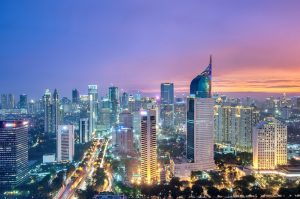It was perhaps little noticed during the controversy and protests in October, but tucked into Indonesia’s recently passed Omnibus bill on job creation was a provision laying the groundwork for a sovereign wealth fund. According to a report in Reuters, the fund will be seeded with $5 billion in state cash and shares in state-owned enterprises (SOEs) with the goal of raising $15 billion from investors. Minister of Finance Sri Mulyani is quoted saying that investors “will have the flexibility to invest in many portfolios” including the electricity, toll road, and health sectors. These industry-specific funds will then be grouped under some kind of larger state-owned holding company.
What does all this mean? To put it mildly, it is a very ambitious idea which raises many more questions than it answers. Reflecting on the proposal last month in the Jakarta Post, Vincent Lingga mused: “The billion-dollar question is whether the international market could have confidence in a sovereign wealth fund launched by a government with relatively high corruption, a fiscal deficit and oil deficits, a tax ratio of less than 11 percent and heavy domestic and foreign debt burdens.” It is unclear how much time the government has actually spent contemplating that question.
The proposed design of this fund is very different from what one might expect. Typically, you find sovereign wealth funds in countries that run big surpluses, such as oil-rich states like Norway. So much capital is flowing into these states, that rather than let it sit idle they group it under a state-owned investment vehicle and go off in search of yields. In Southeast Asia, Singapore’s Temasek Holdings is the giant of the industry, funded by the country’s deep foreign exchange reserves.
With over 300 billion Singaporean dollars in assets under management, Temasek has investments throughout the region. For instance, through Singtel it holds an indirect 35 percent equity stake in Indonesia’s largest telecommunications company, Telkomsel. It also holds majority stakes in an enormous number of domestic assets, such as Singapore Airlines, CapitaLand, and MediaCorp. It is not only a corporate behemoth at home, but deploys Singapore’s surplus overseas in order to create more value for the state. This is clearly a model that Indonesia would like to imitate.
The main wrinkle is that Indonesia doesn’t have a surplus that it can invest. Indeed, the country has lately been a net debtor, and as designed, this fund would only make Indonesia owe even more money to the rest of the world (which is, by the way, not in and of itself a bad thing). This proposal is less of a sovereign wealth fund in the traditional sense of the world, and more of a sovereign request fund where the Indonesian state is asking investors to let it manage their money.
But why wouldn’t investors be better served by simply buying bonds or stock in individual SOEs, like the state-owned toll road company Jasa Marga? What benefit could there be to creating this labyrinthine financial octopus which, even before it has come into being, is already confounding people? I can think of two reasons.
One is that the government and its state-owned companies are becoming concerned about existing debt levels. During Jokowi’s first term, a lot of money was raised on capital markets by SOEs and other special funds in order to finance infrastructure development. This required taking on quite a bit of debt, and the creation of this new financial vehicle may be an attempt to raise more funds without burdening existing balance sheets further.
The other explanation comes from an academic article by Jeffrey M. Chwieroth. He argues that the global proliferation of sovereign wealth funds “resembles the diffusion of a fashion or fad.” One country sees the political and economic firepower of another country’s sovereign wealth fund, and they want to emulate it. I suspect Indonesia’s motivations are likely drawn from some mix of the two.
According to reports, the U.S. International Development Finance Corporation has already pledged to invest $2 billion in the fund. Headed by Adam Boehler, a former roommate of Jared Kushner’s, the IDFC signing a letter of intent to invest in a fund that nobody knows anything about is pretty on brand for the Donald Trump administration. It is also unlikely to be anything more than empty virtue signalling from an administration that is on the way out.
But it is a good reminder that while letters of intent and splashy announcements often command the headlines in Indonesia, they rarely have much bearing on whether something actually comes to pass. For that we need to look into the details: how are these vehicles going to be structured, financed and implemented? Why do they offer a better alternative than existing capital markets or directly investing in SOEs? Until there are satisfying answers to those questions, this sovereign wealth fund, much like Indonesia’s mooted new capital city, may remain more aspirational than actionable.

































